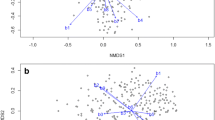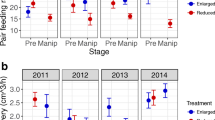Summary
-
1.
The nest defense behavior of a tundra population of savannah sparrows (Passerculus sandwichensis) was examined to determine the relative importance of past investment and future prospects in determining the observed patterns.
-
2.
A comparison of birds initiating nests at various times of the breeding season indicated that the change in renesting potential within a breeding season had little influence on the birds' behavior.
-
3.
For a monomorphic, monogamous passerine the prospective reproductive success for males and females is expected to be quite similar. However, the respective patterns of nest defense behavior differed considerably (Figs. 1 and 2) and most closely reflected past investment. These results are discussed in light of parental investment theory.
Similar content being viewed by others
References
Barash, D.P.: Evolutionary aspects of parental behavior: The distraction behavior of the alpine accentor, Prunella collaris. Wilson Bull. 87, 367–373 (1975)
Boucher, D.H.: On wasting parental investment. Am. Nat. 111, 786–788 (1977)
Dawkins, R., Carlisle, T.R.: Parental investment, mate desertion and a fallacy. Nature 262, 131–133 (1976)
Maynard Smith, J.: Parental investment: A prospective analysis. Anim. Behav. 25, 1–9 (1977)
Potter, P.E.: Territorial behavior in savannah sparrows in south-eastern Michigan. Wilson Bull. 84, 48–59 (1972)
Stobo, W.T., McLaren, I.A. The Ipswich sparrow. Halifax: Nova Scotia Institute of Science 1975
Trivers, R.L.: Parental investment and sexual selection. Campbell, B. (ed.), pp. 136–179. Sexual selection and the descent of man 1871–1971. Chicago: Aldine 1972
Weatherhead, P.J.: Ecological correlates of monogamy in tundra-breeding savannah sparrows. Auk (in press) (1979)
Welsh, D.A.: Savannah sparrow breeding and territoriality on a Nova Scotia dune beach. Auk 92, 235–251 (1975)
Author information
Authors and Affiliations
Rights and permissions
About this article
Cite this article
Weatherhead, P.J. Do savannah sparrows commit the concorde fallacy?. Behav Ecol Sociobiol 5, 373–381 (1979). https://doi.org/10.1007/BF00292525
Received:
Issue Date:
DOI: https://doi.org/10.1007/BF00292525




